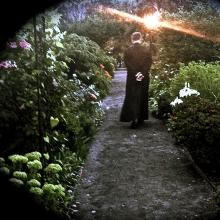Church
"WE DON'T WORK toward justice; we bring about justice through systemic change," says Rev. Cindy Weber, with a fierce and loving smile, when asked how her congregation, Jeff Street Baptist Community at Liberty, seeks justice through reaching out to the community. There is no pride or bravado in her statement, but a firmness that comes from more than 20 years of pastoring a small, community church that actively helps bring about God's peace on earth.
Jeff Street, located in Louisville, Ky., has an active membership of approximately 100 people—a David-sized congregation compared to many mainline or mega-churches. However, the creativity, dedication, and passion of the church's members, manifested in hospitality programs for and with the homeless, have made a giant-sized impact on local economic justice issues. And the congregation didn't stop there; as part of a coalition of area churches, Citizens of Louisville Organized and United Together (CLOUT), the church has made an impression with policy work and community organizing on the state level as well. Jeff Street's commitment to empower poor people has even reached internationally: Members have invested in Oikocredit micro-lending programs to the tune of $180,000.
"We are a church that knows the difference between justice and charity, and also between charity and hospitality," says Weber.
Jeff Street, as members call it, started as the Jefferson Street Baptist Chapel, a worship community that had been meeting for decades at Louisville's Jefferson Street Baptist Center, an outreach to homeless people that is a mission of the Southern Baptist-affiliated Long Run Baptist Association. But when the congregation's head pastor left in 1987 and it promoted Rev. Weber from associate to interim pastor, the move touched off a four-year struggle with the Center's parent organization. The Long Run Baptist Association refused to recognize Weber's leadership because she is a woman—even though, at the time, she was also serving as director of the center. In 1991, the year the congregation installed Weber as permanent pastor, it was told to leave the center. The church kept the name "Jeff Street"—the shortened moniker by which Jefferson Street Baptist Center was known in the nearby Clarksdale housing project and environs—and moved a couple blocks south, into a rehabbed former machine shop on Liberty Street.
“Your body is a wrapped lollipop. When you have sex with a man, he unwraps your lollipop and sucks on it. It may feel great at the time, but, unfortunately, when he’s done with you, all you have left for your next partner is a poorly wrapped, saliva-fouled sucker.”
I cringed behind the wheel, appalled at the quoted words I heard coming from my audio copy of Half the Sky as authors Sheryl WuDunn and Nicholas Kristof discussed this statement uttered by Darren Washington, an abstinence educator, at the Eighth Annual Abstinence Clearinghouse Conference.
Sadly, it wasn’t too far off many Christian messages I’ve received about sex.
But let’s go back to the beginning.
If we try to mold faith into something more certain than simply faith, it becomes something else. A crutch, perhaps, or a drug. So how or when does this happen?
It happens when someone is suffering and we tell them that everything happens for a reason. In the bigger picture, this is that opiate of certainty and assurance being cast over all the chaos, suffering, and doubt in an effort to keep it all tied up neatly in a religious package. But what it creates beneath the surface is a bastardized image of a God who sits in the Great Beyond, plotting out our fortunes and misfortunes, causing loss and heartbreak in our lives for some greater unknown plan. This makes us no more than so much collateral damage in some narcissistic divine game.
Is that really the God we believe in?
IN SPRING 1986, a group of Italian activists led by Carlo Petrini launched a protest against the opening of a McDonald’s near the famous Spanish Steps in Rome. This protest marked the origin of the Slow Food movement, which has spread over the last 26 years to more than 150 countries.
Following this Slow Food effort came a host of other Slow movements—Slow Cities, Slow Parenting, Slow Money, and more—that collectively raise opposition to the speed and industrialization of Western culture. Slow movements are beginning to recover what we have lost in our relentless pursuit of efficiency. Many Christians have been challenged by these Slow movements to consider the ways in which our faith has begun to move too fast as we make sacrifices to the gods of efficiency.
This quest has sparked a renewed interest in the joys of sharing life together in local congregations and has intensified into a growing conversation—rather than a movement—called Slow Church. Slowness itself is not a cardinal virtue of Slow Church, but rather a means of resisting the present-day powers of speed in order to be faithful church communities.
The biblical vision of God’s mission in the world is God’s reconciliation of all creation (see, for example, Colossians 1:15-23 and Isaiah 65:17-25). But too often we narrow the scope of our faith and ignore the massive damage that incurs. Some Christians reduce the faith to four easy steps to stay out of hell, others to a set of techniques for growing a large church, and still others to a political ideology (of the Right or the Left). Christianity has also been reduced by some to a feel-good spirituality that has little or no bearing on the rest of our lives or in the public square.
NAIROBI, Kenya -- Church leaders are pressing the Kenyan government to scientifically test herbal medicines that are used by millions to manage and treat diseases, saying the nontraditional therapies could be putting patients' health at risk.
The leaders say HIV/AIDS patients and others suffering chronic conditions are widely using the medicines, whose efficacy is unknown.
A friend of mine forwarded a link to a recent Huffington Post article about the most and least religious cities in the United States. Interestingly – but hardly surprising – you have to scroll waaaay down the list to find my current city of Portland, Ore.
“Looks like you have your work cut out for you,” he said. He’s right; I’ve met folks here who work in churches that tell people they work at a nonprofit when asked what they do, leaving the bit about the nonprofit being a church until they get to know each other better. And of course, we knew this when we came to the Pacific Northwest.
In fact, that’s part of what made me want to be here.
For some, there is great appeal in coming to an “unchurched” community, mainly because of the notion that this means there are that many more people in need of saving. And while this may or may not be true, there’s a lot of presumption that goes into saving those without religion, while assuming those who claim a faith are the ones to do the “saving.”
OK, church folks. Fasten your seat belts. But don’t hunker down.
There’s a new study out this week that shows that one-in-five Americans has no religious affiliation. Not Baptist, not Catholic, not Lutheran, not Jewish, not Muslim.
For those of us in the world of organized religion, this just adds more data to a trend we have seen accelerating over the last decade.
In 2007, about 15 percent of the adult population in the U.S. described itself as unaffiliated with any religion. In a comparable survey done this summer and released on Tuesday by the Pew Research Center’s Forum on Religion and Public Life, the number hit 20 percent. And if you just focus on those under 30, the religiously unaffiliated constitute one third of that group.
Among those of us who are professional religious types, this is the kind of data that can prompt a lot of gloomy introspection about relevance and a lot of finger pointing at those who are not interested in the same kinds of religious expression that we are.
Let me suggest there’s a less gloomy and less judgmental way to think about this data.
I used to be in a fantasy league, but the fanaticism of the whole thing wore me out. The guys would gather online for an evening-long draft event, debate rules ad nauseam, and haggle over trades through the wee hours. I considered myself to be a fan, but these guys had practically made, well, a religion out of fantasy sports.
I was reading a piece today by Bruce Reyes Chow about what we Christians might learn from fantasy sports, and it got me thinking. One of the most interesting things being in the fantasy league did for me was that it totally changed how I watched the games. I would turn on games I never would have had interest in before, just to see how my selected running back performed. I even found myself rooting against my own favorite teams once in a blue moon when it served my fantasy team and didn’t affect the outcome of the actual game.
The whole experience drove my wife crazy, partly because of all the time it took, but also because the way I engaged sports was so different that, even if we were watching the same game, it was as if we saw two completely different things.
We’re in the middle of a similar kind of shift in the west with respect to organized religion. While folks within the walls of church may be intent primarily on keeping the institutions placed under their care alive, a growing majority of people outside the doors don’t really care about the denominational logo over the entryway, the name inscribed on the stone sign by the street or the long, rich history of all the congregation has meant to the community.
You can tell from its menu whether a restaurant expects to serve tourists, locals or regulars.
At a tourist-centered eatery like those near Times Square, the menu typically is huge: many pages, difficult to scan, sometimes difficult even to hold. There's something for everyone and it's designed to please customers who are strangers.
A restaurant catering to locals will have a much leaner menu, maybe just four or five items in each category. They will all be of a certain type—no words like "Asian fusion" to disguise lack of focus. If the joint is Korean, it will serve Korean.
A third and much rarer type is the restaurant that offers just one multi-course meal each night. Regulars go expecting to be served the chef's whim of the day, not handed a long menu.
When customers are strangers, the owner must imagine what will please a patchwork of German tourists, Chinese tourists, families from Iowa, young techies on the prowl, and marketers in town for a convention.
The better an owner knows the customers, the more focused the menu can be. If not the actual customer, at least the type of person who will come in.
Voting isn't all that different. When politics is local, candidates tend to know their people or at least know their interests, worries and hopes. This is the level at which democracy tends to work best. Leaders know their people, people know their leaders, and known interests are at stake.
In the middle of the 16th century, Catholic bishops and theologians met sporadically in the city of Trento in northern Italy to discuss the church's response to the Reformation. Over the course of 18 years, the Council of Trent produced documents correcting abuses like indulgences and other corruption.
In 1564, the council ordered that some naked figures in Michelangelo's massive "Last Judgment" fresco in the Sistine Chapel be covered up as a result of the council's dictate that "all lasciviousness be avoided; in such wise that figures shall not be painted or adorned with a beauty exciting to lust."
It will be difficult for critics to compare Michelangelo's nudes with the ones photographed by the Rev. John Blair. Just after the Episcopal Diocese of Missouri launched an investigation of the St. Louis priest, many of his photos of nude models were removed from the Internet.
And yet the diocese's disciplinary board, whose members will decide if Blair's photography constitutes sexual misconduct, will try to answer the same question as Trent's participants 450 years ago: How does the church recognize the beauty of art that depicts God's creation — the human form — without seeming to condone "a beauty exciting to lust"?
Family Research Council President Tony Perkins said Sept. 12 that conservative Christians are growing more enthusiastic about GOP presidential nominee Mitt Romney, and predicted they would show up at the polls in record numbers in November.
"When it comes to the values of family, values of faith, values of freedom, Mitt Romney is a clear choice, I think, for value voters across this country," Perkins said at a National Press Club luncheon two days before his organization kicks off its annual Values Voter Summit in Washington.
Perkins, a Southern Baptist, said evangelical Christians have "significant theological differences" with Romney, a Mormon, but he said the GOP nominee, if elected, would not be asked to head a national church.
"We don't want a national church. We want religious freedom," he said. "I think someone who has been a part of a persecuted religion is going to be even more sensitive to the issue of religious freedom."
As baby boomers start clicking the senior citizen box on travel fares, I want to say a word to my generation and to the one that preceded us.
It is time for us to get out of the way.
I don't mean easing into wheelchairs. For the most part, we're way too healthy and energetic for that. I mean the harder work of relinquishing control.
I see that need most clearly in religious institutions, where I work. But I see it elsewhere, too, from taxpayer "revolts" led by seniors against today's schoolchildren to culture wars that we won't let die.
PASTOR T.C. RYAN spent 40 years haunted by the shadow life of compulsive sexual behavior. Despite the challenges, Ryan never gave up hope of trying to reach the fullest recovery. He tells his story in Ashamed No More.
Compulsive sexual behavior put Tiger Woods into the headlines and made him an object of ridicule, as it has for so many others. In telling his own story, Ryan tears back the curtain to reveal the fuller story of painful realities, challenges, and hopes for those faced with the daunting task of recovery from similar compulsions.
“Those who are not addicted to sex understandably assume that the addict at least experiences enjoyment from the sexual activity, but this is not the case,” Ryan writes.
As Ryan describes it, he was living a divided life. In one arena he was a capable and gifted pastor. In the other he was plagued by shame, self-loathing, and an inability to stop destructive behavior. His extensive explanation of the cycle of addiction, the lies he had come to believe from childhood, the role that therapy and other supportive measures played in his recovery, and his hopes for how the church can become the ultimate 12-step program make every chapter of this book essential.
On Aug. 17, three members of the Russian feminist punk band/performance art group Pussy Riot received the verdict in the criminal case against them: Guilty of "hooliganism" motivated by "religious hatred." Each was sentenced to two years in prison.
As a faith-based community organizer, I spend a great majority of my time trying to get political issues into the church so that the gospel can be relevant to the reality of those on and off the pews.
Therefore, I believe the best place for a “pussy riot” is the church. Although this may seem sacrilegious, here's why:
1. When the church ignores social and political issues it silently blesses injustice. (See slavery, the Holocaust, lynching, and child sexual abuse.) Testimony Time is a set time in many Black Churches when congregants can speak of their pains and triumphs and how God brought them through.
Testimony time is democratic and a time of raw honesty. I call what Pussy Riot did protestifying because they protested by testifying about the political conditions of their country.
Editor's Note: This is the sixth and final installment of Presbyterian pastor Mark Sandlin's blog series "Church No More," chronicling his three-month sabbatical from church-going.
They say you can never go home again.
The thinking is that, having left and experienced new things, you have changed and the people back home have continued in their lives just as you left them. Your experience of going back home again necessarily will be very different from your experience of home as you remember it, even though it may have changed very little.
In many ways, Church is one of my homes and I left it. I walked away for three months and experienced a bit of life outside of it. The three months are up and I'm going back home. This coming Sunday (Sept. 2) will be my first Sunday back.
The saying “you can't go home again,” probably originated from Tom Wolfe's novel, You Can't Go Home Again. It's the story of an author who leaves his home, writes about it from a distance and then tries to go home again. It doesn't exactly go well. The folks in the town are none-too-happy about him airing their dirty laundry so publicly.
So, you can't go home again? Well, I'm going to try.
The economy continues to weigh on pastors, with a new survey showing that nearly two-thirds say it has affected their churches negatively.
LifeWay Research asked 1,000 pastors about the economy’s effect on their churches and found that 56 percent described it somewhat negatively and 8 percent very negatively. Nine percent reported a positive effect on their churches and one-quarter said the economy was having “no impact on my church.”
“Pastor views on the economy are similar to many economic outlook surveys,” said Scott McConnell, director of LifeWay Research, which is affiliated with the Southern Baptist Convention. “We weren’t surprised the current perspective of economic impact on churches is predominantly negative.”
RIDGEWOOD, N.J. — The parents of Tyler Clementi have left their longtime evangelical church due to its views on homosexuality.
Jane and Joe Clementi told The New York Times that they had grown increasingly out of step with the Grace Church, a nondenominational evangelical church in Ridgewood, N.J., due to its casting of homsexuality as sinful.
Tyler Clementi committed suicide by jumping off the George Washington Bridge in 2010. His death came just days after his roommate, Dharun Ravi, had spied on him during a tryst with another man in their freshman dormitory at Rutgers University.
Ravi was convicted of 15 charges, including invasion of privacy and bias intimidation, in March. He was sentenced to 30 days in jail, of which he served 20.
The case garnered national attention from the media, as well as gay rights and anti-bullying activists. Clementi had come out to his parents just days before he left for college, and numerous news outlets reported that he had left feeling rejected. According to the Times, Tyler told his mother that he did not believe he could be Christian and gay.
Mars Hill Bible Church has appointed a new teaching pastor, months after founding pastor and well-known author Rob Bell departed for California.
In an email sent on Wednesday to members of the Grandville, Mich., church, leaders announced Kent Dobson had accepted the lead position.
Dobson served as a worship director in the church’s early days and has preached as a guest speaker in the months since Bell left. He is the son of Ed Dobson, pastor emeritus at Calvary Church in Grand Rapids.
As I was driving today I had the radio on scan. It filtered through the stations skipping to the next station automatically. Station after station came and went. I finally stopped it on a talk show.
I listened for a time as the host was telling anyone who would listen including me that our country is moving full steam ahead in the wrong direction. He predicted the worst and called Christians to rise up and reclaim our nation.
This was not the first time I have heard such fear mongering. Not too long ago someone warned me that our government would soon “come after churches that don't toe the party line.” Another told me that our government was out to destroy the Christian faith. I think this sounds great.
Editor's Note: This is the fourth installment of Presbyterian pastor Mark Sandlin's blog series "Church No More," chronicling his three-month sabbatical from church-going. Follow the links below to read his previous installments, beginning in June.
- Church No More: Part 1 — Walking Away From Church
- Church No More: Part 2 — Church That Doesn't Steal Your Joy
- Church No More: Part 3 — The 'C' Word
- Church No More: Part 4 — I Don't Want to Go Back
A little over two months ago, I decided I'd spend my three-month sabbatical not going to church. Which might seem like a perfectly normal thing to do – except that I'm a minister. I've had some strange and wonderful experiences which I've written about, but possibly more strange and more wonderful than the experiences are the responses I've received.
From the very beginning the most frustrating response I get is not folks telling me I'll lose my faith if I leave church (and they have), or the ones telling me I can't begin to understand what it's like to be Spiritual But Not Religious (SBNR) in three short months (lots of those were also disturbingly aggressively worded), but rather the ones that say, “Oh, 'sabbatical!' Thanks. Now I have a word to call what I do! I stopped going to church years ago.”
“No!” I'd think while unsuccessfully trying to figure out how to reach through my laptop screen and shake some sense into them, “You are not on sabbatical! The sabbatical I'm taking about has to do with taking a rest, not leaving. It's rest and recuperation — communion with God in a way that is restorative. It's not about leaving! Sheesh.”
More than two months into my sabbatical, I now have to say, “Boy was I wrong.” They are on sabbatical, more so than I am.















